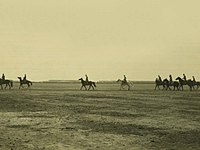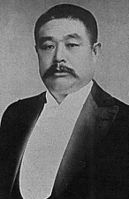Li Yuanhong
Li Yuanhong | |
|---|---|
黎元洪 | |
 Li c. 1915 | |
| President of the Republic of China | |
| In office 11 June 1922 – 13 June 1923 | |
| Preceded by | Zhou Ziqi |
| Succeeded by | Gao Lingwei |
| In office 7 June 1916 – 17 July 1917 | |
| Preceded by | Yuan Shikai |
| Succeeded by | Feng Guozhang |
| Provisional Vice President of the Republic of China | |
| In office 1 January 1912 – 6 June 1916 | |
| President | Sun Yat-sen Yuan Shikai |
| Succeeded by | Feng Guozhang |
| Personal details | |
| Born | 19 October 1864 Xinhai Revolution |
Li Yuanhong (Chinese: 黎元洪; pinyin: Lí Yuánhóng; courtesy name Songqing 宋卿) (October 19, 1864 – June 3, 1928) was a Chinese politician during the Qing dynasty and the Republic of China. He was the president of the Republic of China between 1916 and 1917, and between 1922 and 1923.
Early life

A native of
National prominence
When the
While Li commanded the rebel army,
In 1913, he combined the Republicans with
Presidency and later life
Li served as president from 7 June 1916 to 17 July 1917. When Yuan died, he left a will containing Li's name along with Premier
He served again as president of China between 11 June 1922 and 13 June 1923 after Cao Kun forced out President Xu Shichang. Li was chosen because he was respected by all of the factions and was hoped to reunify the country. He accepted only with the private assurances that warlord forces be disbanded; they were never honored. Like his first term, he called back the original National Assembly but he was even more powerless than before. He organized the "Able Men Cabinet" consisting of prestigious experts but it became undone when he arrested the finance minister for graft after examining rumours and circumstantial evidence; a court threw out the charges. Cao soon harbored presidential ambitions himself and orchestrated strikes to force Li out of office. Cao went as far as trying to bribe the assembly into impeaching him. When Li was vacating the capital, he attempted to take the presidential seal with him but was intercepted. He fled to Japan for medical treatment and returned to Tianjin in 1924 where he later died. His tomb, built in 1935 and restored in 2011, is situated on campus of Central China Normal University in Wuhan. He married Wu Jingjun (1870-1930) and had four children.
-
Li Yuanhong about 1917
-
Li Yuanhong riding a horse and attending a parade
-
Li Yuanhong in civilian attire
See also
References
External links
 Media related to Li Yuanhong at Wikimedia Commons
Media related to Li Yuanhong at Wikimedia Commons




